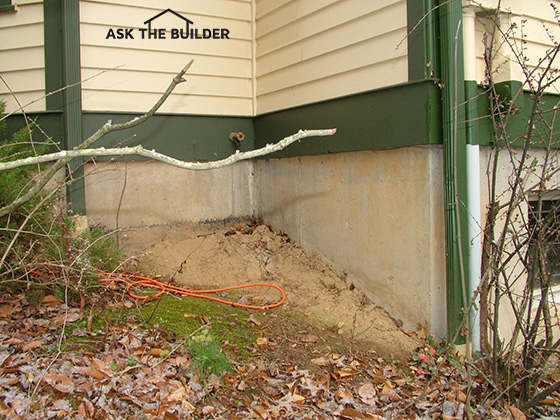Thickness of Poured Concrete Foundation Walls

The thickness of the foundation walls you are looking at are not the same. The wall below and the one to the left of the hose bib faucet are only 8 inches thick. The other walls are 10 inches thick even though there is less soil pressing against them. Why? The 8 inch thick walls are very short and they form part of half an octagon that creates a vast amount of strength. The thicker wall is straight and runs nearly 40 feet from the corner where you see the downspout. © 2017 Tim Carter
Thickness of Poured Concrete Foundation Walls TIPS
- 8 inches is minimum
- 10 inches thick on walls taller than 8 feet
- Higher PSI for extra strength
- Exceed code requirements
- CLICK HERE to Get Tim's FREE & FUNNY Newsletter!
DEAR TIM: How thick should a poured concrete foundation wall be? Is it a function of the size of the house? Bob McKnight, Hagerstown, MD
DEAR BOB: The answer, although fairly intuitive, is not as crystal clear as you might think. As a poured concrete wall gets taller, it needs to be thicker. But there are many other variables that control the thickness of the wall.
A structural engineer would consider lateral loads as well as loads from the structure above. Even concentrated loads from columns and beam pockets within a wall must be considered.
Really A Retaining Wall
To help visualize what is really happening with foundation walls, especially those that are buried in the ground, think about simple retaining walls.
Perhaps you have seen a retaining wall that has tipped over, was leaning or has cracked. The soil on the other side of a basement wall exerts a powerful force and this needs to be taken into consideration when designing and building a foundation wall.
Add Steel
To add further confusion, you also have to factor in reinforcing steel. Steel bars that are incorporated into poured concrete add enormous strength to the wall system. The placement of the steel is critical depending upon how you are trying to strengthen the wall.
Huge Soil Pressure
For example, if soil loads are significant and a house is built into a hillside, vertical reinforcing steel is a must. The pressure of the soil creeping down the hill can cause a foundation wall to develop a horizontal crack much like when you snap a saltine cracker in half with your fingers.
Vertical steel bars of a given thickness spaced a distinct distance apart and placed at a precise place within the wall can help ensure the wall will not fail. Structural engineers know exactly where the steel needs to be and how much to include.
Recommendations
There are some basic rules of thumb for foundation wall thickness and these are outlined in many modern building codes. Poured concrete foundation walls that are less than 8 feet tall and have soil outside that is 6 or 7 feet deep against the wall can often be 8 inches thick and function quite well.
As soon as you go higher or have greater depths of soil pushing against the wall, you need to increase the thickness to 10 inches.
Pilasters / Buttresses
You may even have to put in pilasters or buttresses to strengthen long, tall walls. A pilaster is a thickened part of a wall in a short distance.
For example, a 10-inch thick wall may all of a sudden thicken to 16 inches for just a foot or so. That's a pilaster.
A buttress is a short stub wall that extends inside the perimeter of the foundation. It might be 3 or 4-feet long. It does the same job as a beam would do under a floor joist.
High-Strength Concrete
Don't forget that the concrete comes in different strengths depending upon how much cement is added at the ready-mix plant. I would use a minimum mix of 3,500 pounds per square inch(psi) mix. You can upgrade to 4,000 psi concrete if you desire, but I would only do this if it was specified by the structural engineer.
One last point: Remember that the specifications in the building code are minimum standards. You can always improve upon the guidelines you see in the code.
Column N4
9 Responses to Thickness of Poured Concrete Foundation Walls